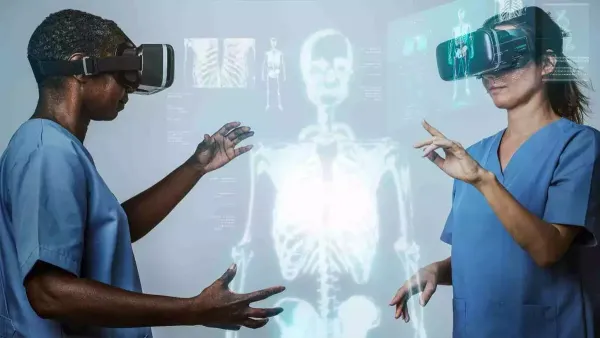
Delhi Delhi. India's healthcare scenario is growing rapidly, which is inspired by increasing population, rising healthcare cost and increasing demand for better care. Artificial Intelligence (AI) is emerging as a transformative power in Indian hospitals, improving the efficiency, accuracy and access of medical services. AI in healthcare, AI machine improves both clinical and operational aspects of learning, deep learning, natural language processing and predictive analytics. As one of the world's largest healthcare markets, AI presents a promising opportunity to resolve important challenges such as accuracy for India accuracy, infrastructure reduction and rising medical costs.
India's healthcare system, which serves more than 1.4 billion people, is facing important challenges. Innovative solutions are required for limited resources, lack of healthcare professionals and increasing burden of both communicable and non-communicable diseases. AI techniques offer a glimpse of hope, which helps to bridge these shortcomings by improving healthcare distribution in many major areas.
One of the most promising applications of AI in healthcare is in the field of diagnosis. In Indian hospitals, AI is being used to increase the accuracy of diagnosis, especially in areas such as radiology, pathology and ophthalmology. AI algorithm can analyze medical images such as CT scans, MRI and X-ray, which can detect anomalies that can be detected from the human eye.
For example, AI-operated equipment has been used to improve breast cancer detection, which can reduce both wrong positive and wrong negative in cases made biopsy-affected cases. Hospitals such as Apollo and Fortis Healthcare are already taking advantage of AI to help in diagnosing conditions such as heart disease, stroke and even cancer. The AI's ability to increase the accuracy of diagnosis is not only improving the patient's results, but also reducing the burden on healthcare professionals. With the AI system, doctors can reach highly accurate diagnosis more quickly to the insight, helping them to make timely decisions that can save life. For example, in ophthalmology, the AI system can identify early symptoms of diabetes retinopathy, which helps prevent blindness in diabetic patients.
AI's predictions in healthcare are another game-changer, especially in the prevention and management of the disease. Using the giant dataset, AI can predict the outbreak of the disease, track the pattern and help in the initial identity. In India, forecasting models have been used to monitor the spread of diseases such as tuberculosis and dengue, which can take preventive measures on time. The role of AI in forecasting analysis also extends to the identification of risk patients and recommends individual treatment plans. For example, machine learning algorithms can analyze the patient's data, including genetics, lifestyle factors, and medical history, to estimate which patients are most likely to develop certain conditions. Earlier intervention and better results can occur, especially for chronic diseases such as diabetes and high blood pressure.
In a country like India, where rural areas often lack access to quality healthcare, AI-operated telemedicine platforms are making a significant difference. AI-operated virtual assistant and chatbot are being used to consult distance consultation, assess and provide initial diagnosis. Integrated in platforms such as practo and mfine, these systems help patients reach health services without getting out of their homes. The World Health Organization (WHO) has also deployed an AI-based virtual health assistant named Sara available in many languages to provide 24/7 healthcare guidance. AI reduces geographical obstacles, by connecting patients from far away from healthcare providers, ensuring that more people can receive medical advice on time. This is particularly important in the vast rural areas of India, where there is frequent lack of infrastructure of healthcare.